Report on Leadership and Management Skills Comparison at Tesco
VerifiedAdded on 2021/01/02
|12
|2983
|427
Report
AI Summary
This report provides a comprehensive analysis of leadership and management practices within Tesco, a leading multinational retailer. It begins by comparing the importance of leadership and management skills, highlighting their distinct roles and contributions to organizational success, including motivation, decision-making, communication, and problem-solving. The report then differentiates between good leaders and good managers, outlining their respective focuses, strategies, and styles, while also acknowledging their shared goals in achieving organizational objectives. Furthermore, it explores the significance of ethics and corporate social responsibility (CSR) in shaping effective leaders and managers, emphasizing the importance of ethical conduct and social responsibility. The report also outlines the key skills and qualities of both leaders and managers, such as motivation, trustworthiness, decision-making, and problem-solving, illustrated with a real-world example from H&R Block. Finally, the report examines various leadership and management theories, including scientific and bureaucratic management, providing practical examples of their application within Tesco and other companies. The report concludes with a discussion of how these theories contribute to effective organizational performance and employee behavior.
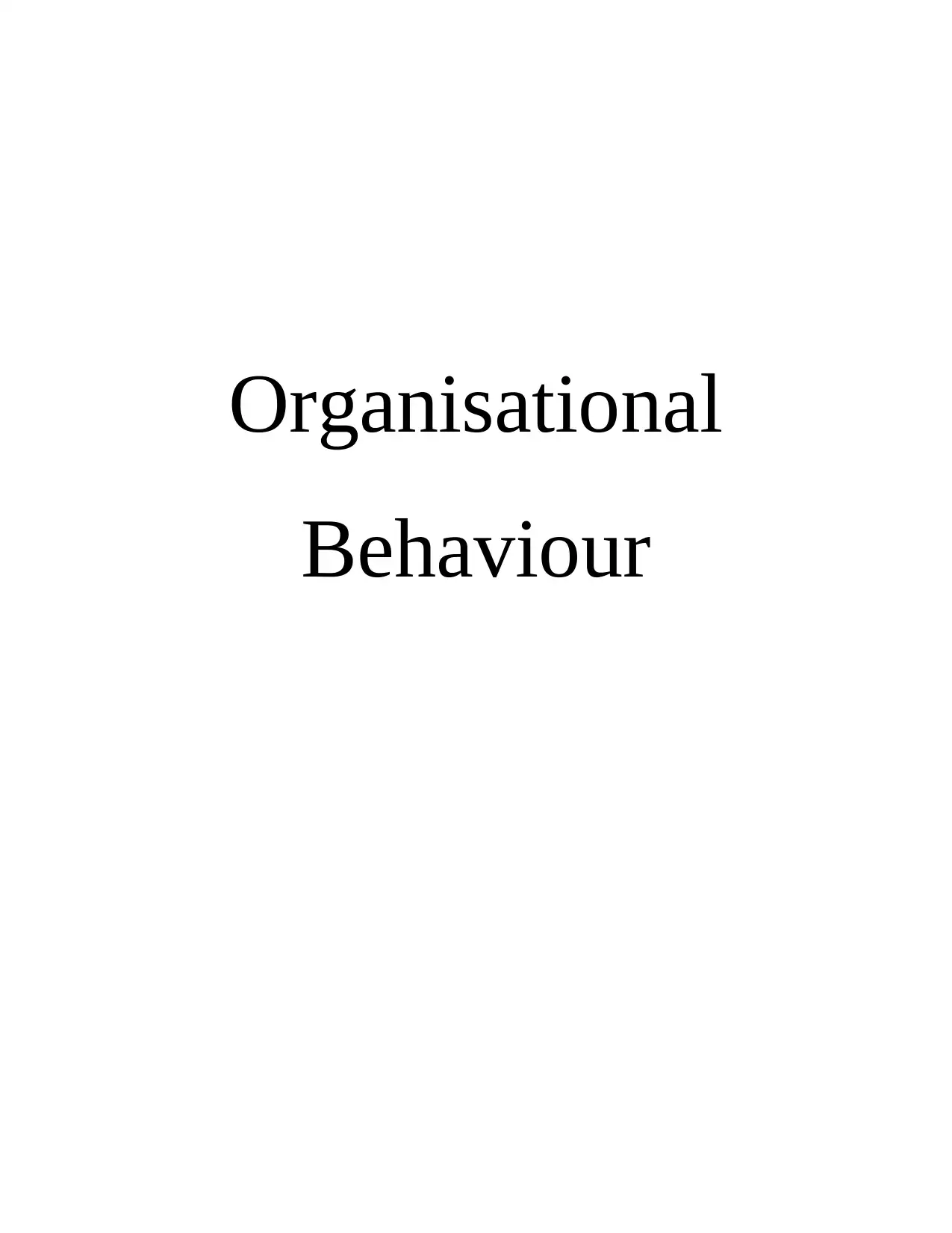
Organisational
Behaviour
Behaviour
Paraphrase This Document
Need a fresh take? Get an instant paraphrase of this document with our AI Paraphraser
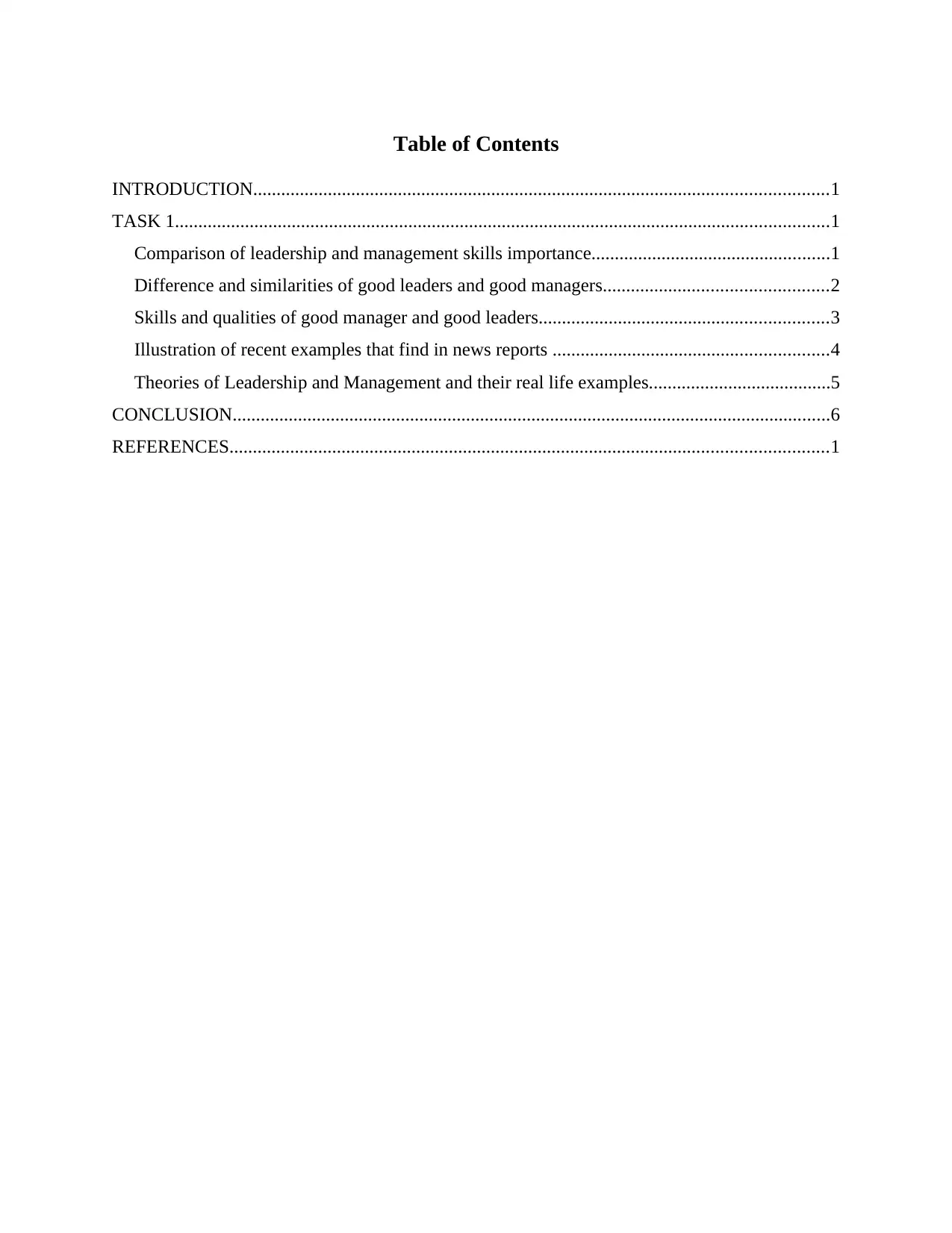
Table of Contents
INTRODUCTION...........................................................................................................................1
TASK 1............................................................................................................................................1
Comparison of leadership and management skills importance...................................................1
Difference and similarities of good leaders and good managers................................................2
Skills and qualities of good manager and good leaders..............................................................3
Illustration of recent examples that find in news reports ...........................................................4
Theories of Leadership and Management and their real life examples.......................................5
CONCLUSION................................................................................................................................6
REFERENCES................................................................................................................................1
INTRODUCTION...........................................................................................................................1
TASK 1............................................................................................................................................1
Comparison of leadership and management skills importance...................................................1
Difference and similarities of good leaders and good managers................................................2
Skills and qualities of good manager and good leaders..............................................................3
Illustration of recent examples that find in news reports ...........................................................4
Theories of Leadership and Management and their real life examples.......................................5
CONCLUSION................................................................................................................................6
REFERENCES................................................................................................................................1
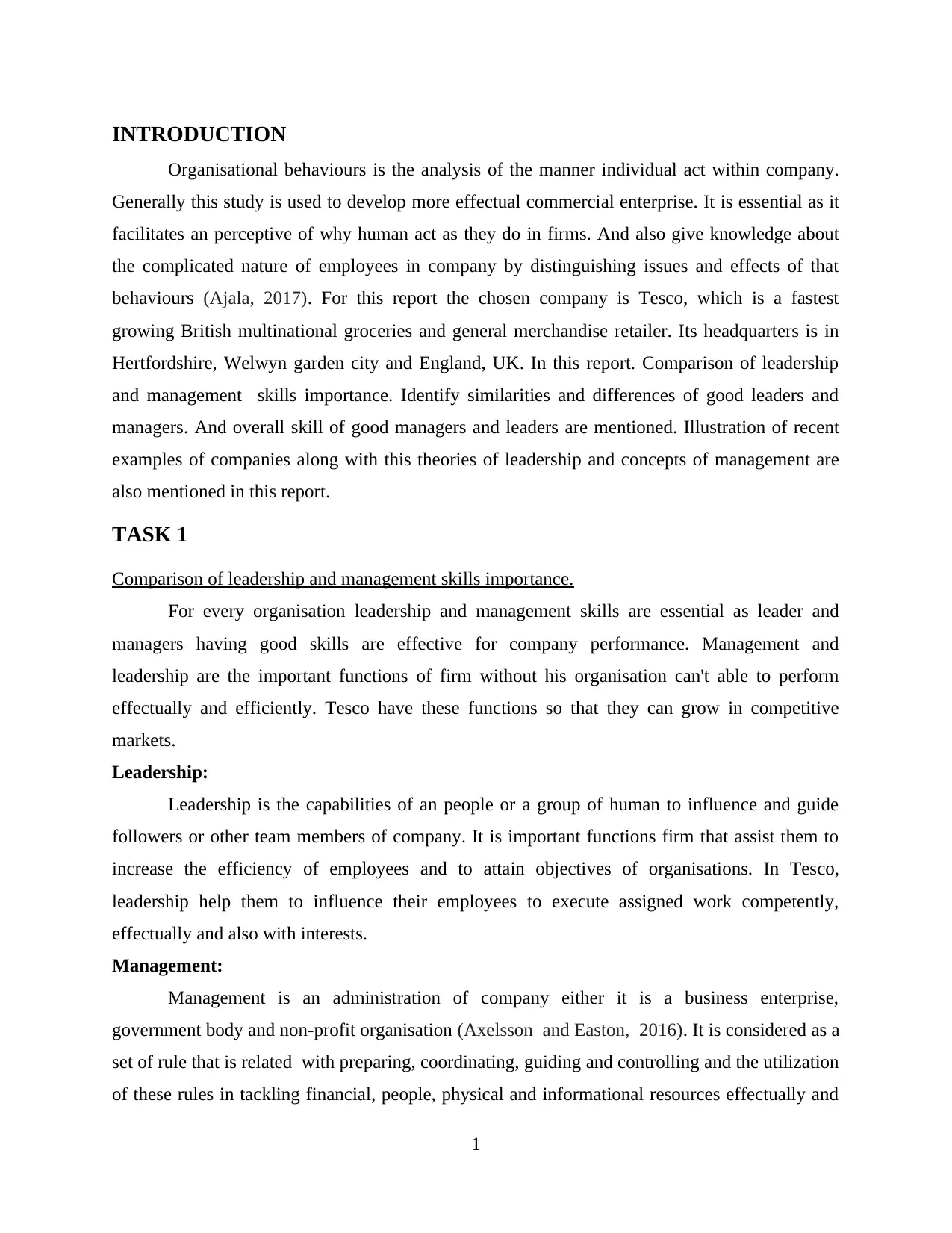
INTRODUCTION
Organisational behaviours is the analysis of the manner individual act within company.
Generally this study is used to develop more effectual commercial enterprise. It is essential as it
facilitates an perceptive of why human act as they do in firms. And also give knowledge about
the complicated nature of employees in company by distinguishing issues and effects of that
behaviours (Ajala, 2017). For this report the chosen company is Tesco, which is a fastest
growing British multinational groceries and general merchandise retailer. Its headquarters is in
Hertfordshire, Welwyn garden city and England, UK. In this report. Comparison of leadership
and management skills importance. Identify similarities and differences of good leaders and
managers. And overall skill of good managers and leaders are mentioned. Illustration of recent
examples of companies along with this theories of leadership and concepts of management are
also mentioned in this report.
TASK 1
Comparison of leadership and management skills importance.
For every organisation leadership and management skills are essential as leader and
managers having good skills are effective for company performance. Management and
leadership are the important functions of firm without his organisation can't able to perform
effectually and efficiently. Tesco have these functions so that they can grow in competitive
markets.
Leadership:
Leadership is the capabilities of an people or a group of human to influence and guide
followers or other team members of company. It is important functions firm that assist them to
increase the efficiency of employees and to attain objectives of organisations. In Tesco,
leadership help them to influence their employees to execute assigned work competently,
effectually and also with interests.
Management:
Management is an administration of company either it is a business enterprise,
government body and non-profit organisation (Axelsson and Easton, 2016). It is considered as a
set of rule that is related with preparing, coordinating, guiding and controlling and the utilization
of these rules in tackling financial, people, physical and informational resources effectually and
1
Organisational behaviours is the analysis of the manner individual act within company.
Generally this study is used to develop more effectual commercial enterprise. It is essential as it
facilitates an perceptive of why human act as they do in firms. And also give knowledge about
the complicated nature of employees in company by distinguishing issues and effects of that
behaviours (Ajala, 2017). For this report the chosen company is Tesco, which is a fastest
growing British multinational groceries and general merchandise retailer. Its headquarters is in
Hertfordshire, Welwyn garden city and England, UK. In this report. Comparison of leadership
and management skills importance. Identify similarities and differences of good leaders and
managers. And overall skill of good managers and leaders are mentioned. Illustration of recent
examples of companies along with this theories of leadership and concepts of management are
also mentioned in this report.
TASK 1
Comparison of leadership and management skills importance.
For every organisation leadership and management skills are essential as leader and
managers having good skills are effective for company performance. Management and
leadership are the important functions of firm without his organisation can't able to perform
effectually and efficiently. Tesco have these functions so that they can grow in competitive
markets.
Leadership:
Leadership is the capabilities of an people or a group of human to influence and guide
followers or other team members of company. It is important functions firm that assist them to
increase the efficiency of employees and to attain objectives of organisations. In Tesco,
leadership help them to influence their employees to execute assigned work competently,
effectually and also with interests.
Management:
Management is an administration of company either it is a business enterprise,
government body and non-profit organisation (Axelsson and Easton, 2016). It is considered as a
set of rule that is related with preparing, coordinating, guiding and controlling and the utilization
of these rules in tackling financial, people, physical and informational resources effectually and
1
⊘ This is a preview!⊘
Do you want full access?
Subscribe today to unlock all pages.

Trusted by 1+ million students worldwide
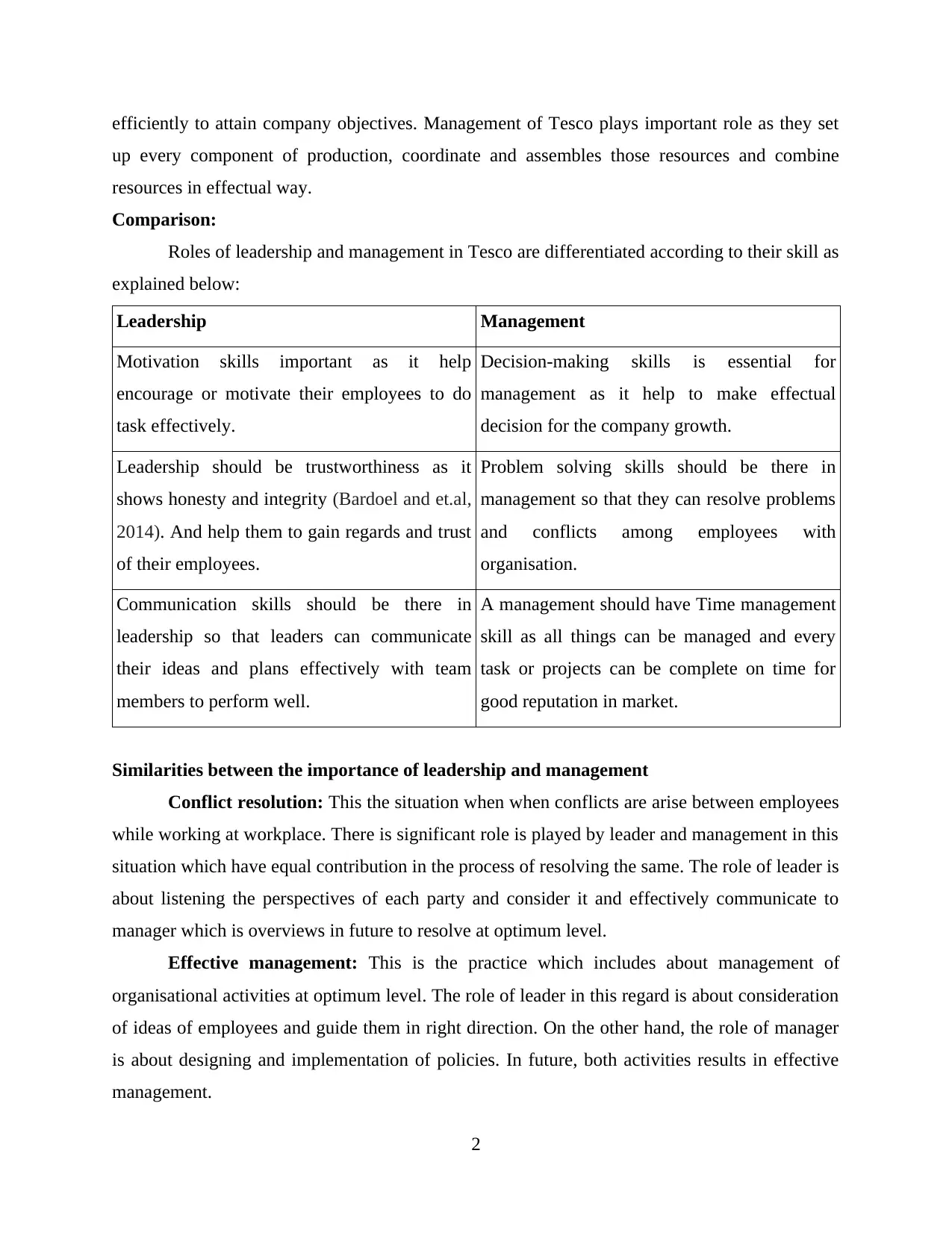
efficiently to attain company objectives. Management of Tesco plays important role as they set
up every component of production, coordinate and assembles those resources and combine
resources in effectual way.
Comparison:
Roles of leadership and management in Tesco are differentiated according to their skill as
explained below:
Leadership Management
Motivation skills important as it help
encourage or motivate their employees to do
task effectively.
Decision-making skills is essential for
management as it help to make effectual
decision for the company growth.
Leadership should be trustworthiness as it
shows honesty and integrity (Bardoel and et.al,
2014). And help them to gain regards and trust
of their employees.
Problem solving skills should be there in
management so that they can resolve problems
and conflicts among employees with
organisation.
Communication skills should be there in
leadership so that leaders can communicate
their ideas and plans effectively with team
members to perform well.
A management should have Time management
skill as all things can be managed and every
task or projects can be complete on time for
good reputation in market.
Similarities between the importance of leadership and management
Conflict resolution: This the situation when when conflicts are arise between employees
while working at workplace. There is significant role is played by leader and management in this
situation which have equal contribution in the process of resolving the same. The role of leader is
about listening the perspectives of each party and consider it and effectively communicate to
manager which is overviews in future to resolve at optimum level.
Effective management: This is the practice which includes about management of
organisational activities at optimum level. The role of leader in this regard is about consideration
of ideas of employees and guide them in right direction. On the other hand, the role of manager
is about designing and implementation of policies. In future, both activities results in effective
management.
2
up every component of production, coordinate and assembles those resources and combine
resources in effectual way.
Comparison:
Roles of leadership and management in Tesco are differentiated according to their skill as
explained below:
Leadership Management
Motivation skills important as it help
encourage or motivate their employees to do
task effectively.
Decision-making skills is essential for
management as it help to make effectual
decision for the company growth.
Leadership should be trustworthiness as it
shows honesty and integrity (Bardoel and et.al,
2014). And help them to gain regards and trust
of their employees.
Problem solving skills should be there in
management so that they can resolve problems
and conflicts among employees with
organisation.
Communication skills should be there in
leadership so that leaders can communicate
their ideas and plans effectively with team
members to perform well.
A management should have Time management
skill as all things can be managed and every
task or projects can be complete on time for
good reputation in market.
Similarities between the importance of leadership and management
Conflict resolution: This the situation when when conflicts are arise between employees
while working at workplace. There is significant role is played by leader and management in this
situation which have equal contribution in the process of resolving the same. The role of leader is
about listening the perspectives of each party and consider it and effectively communicate to
manager which is overviews in future to resolve at optimum level.
Effective management: This is the practice which includes about management of
organisational activities at optimum level. The role of leader in this regard is about consideration
of ideas of employees and guide them in right direction. On the other hand, the role of manager
is about designing and implementation of policies. In future, both activities results in effective
management.
2
Paraphrase This Document
Need a fresh take? Get an instant paraphrase of this document with our AI Paraphraser
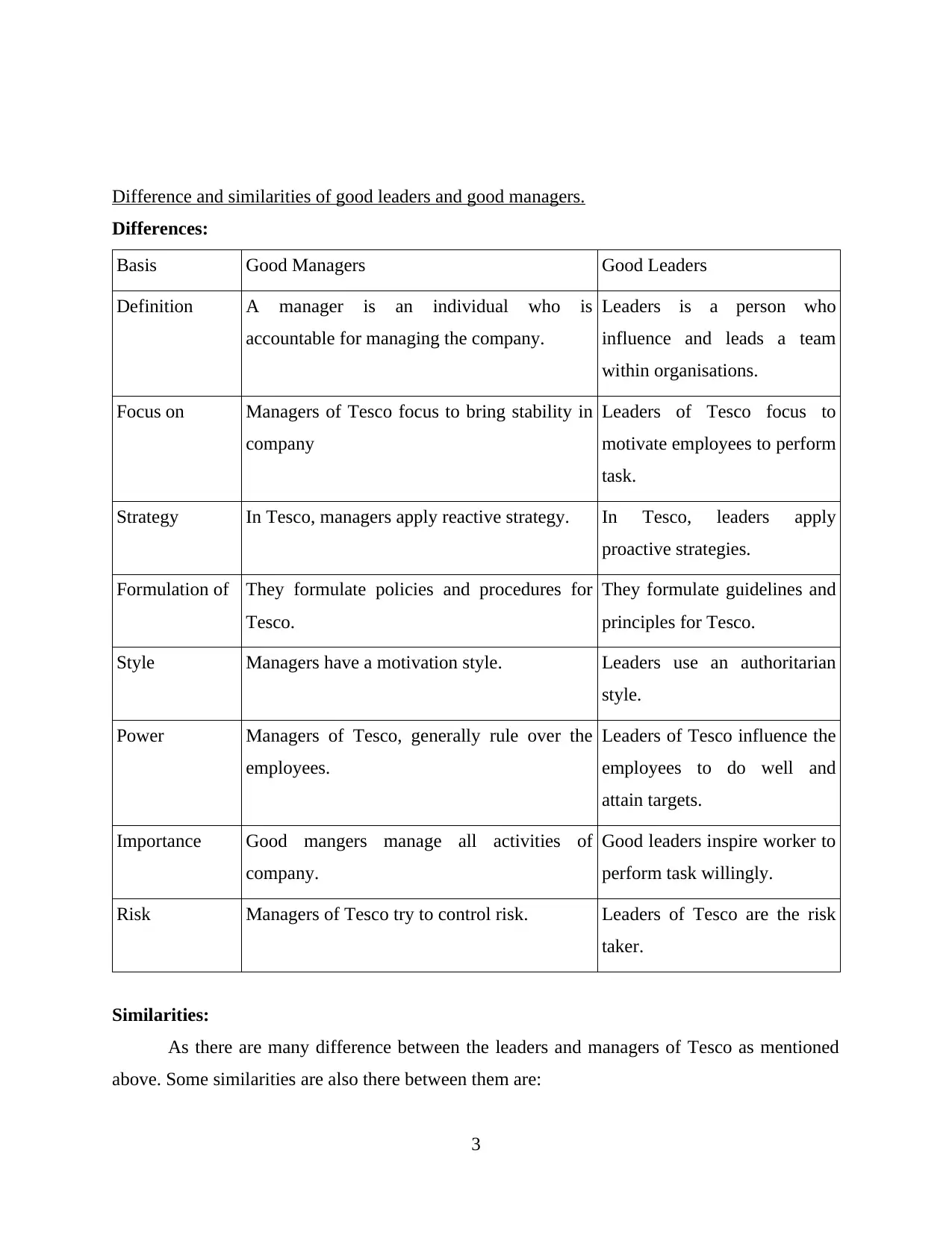
Difference and similarities of good leaders and good managers.
Differences:
Basis Good Managers Good Leaders
Definition A manager is an individual who is
accountable for managing the company.
Leaders is a person who
influence and leads a team
within organisations.
Focus on Managers of Tesco focus to bring stability in
company
Leaders of Tesco focus to
motivate employees to perform
task.
Strategy In Tesco, managers apply reactive strategy. In Tesco, leaders apply
proactive strategies.
Formulation of They formulate policies and procedures for
Tesco.
They formulate guidelines and
principles for Tesco.
Style Managers have a motivation style. Leaders use an authoritarian
style.
Power Managers of Tesco, generally rule over the
employees.
Leaders of Tesco influence the
employees to do well and
attain targets.
Importance Good mangers manage all activities of
company.
Good leaders inspire worker to
perform task willingly.
Risk Managers of Tesco try to control risk. Leaders of Tesco are the risk
taker.
Similarities:
As there are many difference between the leaders and managers of Tesco as mentioned
above. Some similarities are also there between them are:
3
Differences:
Basis Good Managers Good Leaders
Definition A manager is an individual who is
accountable for managing the company.
Leaders is a person who
influence and leads a team
within organisations.
Focus on Managers of Tesco focus to bring stability in
company
Leaders of Tesco focus to
motivate employees to perform
task.
Strategy In Tesco, managers apply reactive strategy. In Tesco, leaders apply
proactive strategies.
Formulation of They formulate policies and procedures for
Tesco.
They formulate guidelines and
principles for Tesco.
Style Managers have a motivation style. Leaders use an authoritarian
style.
Power Managers of Tesco, generally rule over the
employees.
Leaders of Tesco influence the
employees to do well and
attain targets.
Importance Good mangers manage all activities of
company.
Good leaders inspire worker to
perform task willingly.
Risk Managers of Tesco try to control risk. Leaders of Tesco are the risk
taker.
Similarities:
As there are many difference between the leaders and managers of Tesco as mentioned
above. Some similarities are also there between them are:
3
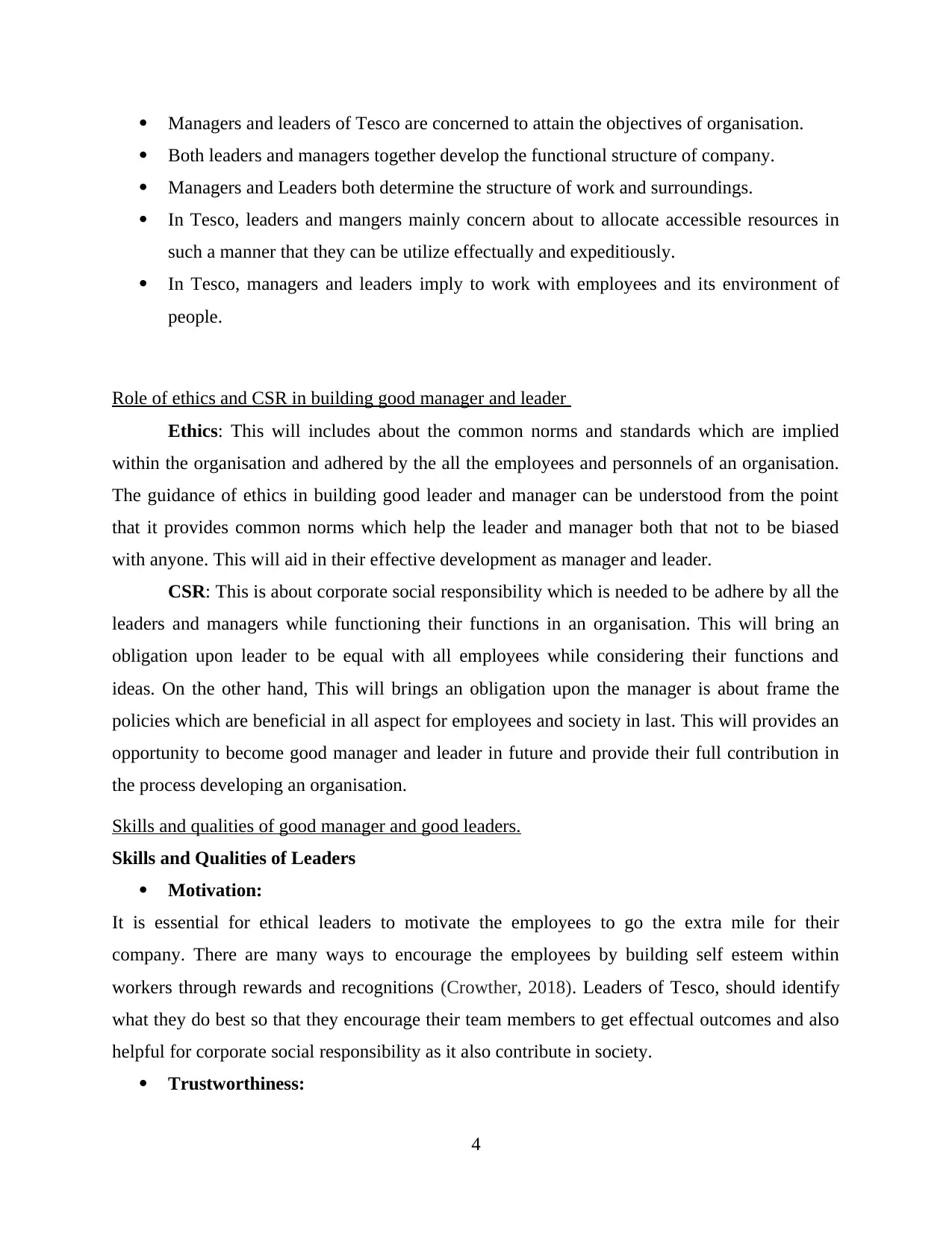
Managers and leaders of Tesco are concerned to attain the objectives of organisation.
Both leaders and managers together develop the functional structure of company.
Managers and Leaders both determine the structure of work and surroundings.
In Tesco, leaders and mangers mainly concern about to allocate accessible resources in
such a manner that they can be utilize effectually and expeditiously.
In Tesco, managers and leaders imply to work with employees and its environment of
people.
Role of ethics and CSR in building good manager and leader
Ethics: This will includes about the common norms and standards which are implied
within the organisation and adhered by the all the employees and personnels of an organisation.
The guidance of ethics in building good leader and manager can be understood from the point
that it provides common norms which help the leader and manager both that not to be biased
with anyone. This will aid in their effective development as manager and leader.
CSR: This is about corporate social responsibility which is needed to be adhere by all the
leaders and managers while functioning their functions in an organisation. This will bring an
obligation upon leader to be equal with all employees while considering their functions and
ideas. On the other hand, This will brings an obligation upon the manager is about frame the
policies which are beneficial in all aspect for employees and society in last. This will provides an
opportunity to become good manager and leader in future and provide their full contribution in
the process developing an organisation.
Skills and qualities of good manager and good leaders.
Skills and Qualities of Leaders
Motivation:
It is essential for ethical leaders to motivate the employees to go the extra mile for their
company. There are many ways to encourage the employees by building self esteem within
workers through rewards and recognitions (Crowther, 2018). Leaders of Tesco, should identify
what they do best so that they encourage their team members to get effectual outcomes and also
helpful for corporate social responsibility as it also contribute in society.
Trustworthiness:
4
Both leaders and managers together develop the functional structure of company.
Managers and Leaders both determine the structure of work and surroundings.
In Tesco, leaders and mangers mainly concern about to allocate accessible resources in
such a manner that they can be utilize effectually and expeditiously.
In Tesco, managers and leaders imply to work with employees and its environment of
people.
Role of ethics and CSR in building good manager and leader
Ethics: This will includes about the common norms and standards which are implied
within the organisation and adhered by the all the employees and personnels of an organisation.
The guidance of ethics in building good leader and manager can be understood from the point
that it provides common norms which help the leader and manager both that not to be biased
with anyone. This will aid in their effective development as manager and leader.
CSR: This is about corporate social responsibility which is needed to be adhere by all the
leaders and managers while functioning their functions in an organisation. This will bring an
obligation upon leader to be equal with all employees while considering their functions and
ideas. On the other hand, This will brings an obligation upon the manager is about frame the
policies which are beneficial in all aspect for employees and society in last. This will provides an
opportunity to become good manager and leader in future and provide their full contribution in
the process developing an organisation.
Skills and qualities of good manager and good leaders.
Skills and Qualities of Leaders
Motivation:
It is essential for ethical leaders to motivate the employees to go the extra mile for their
company. There are many ways to encourage the employees by building self esteem within
workers through rewards and recognitions (Crowther, 2018). Leaders of Tesco, should identify
what they do best so that they encourage their team members to get effectual outcomes and also
helpful for corporate social responsibility as it also contribute in society.
Trustworthiness:
4
⊘ This is a preview!⊘
Do you want full access?
Subscribe today to unlock all pages.

Trusted by 1+ million students worldwide
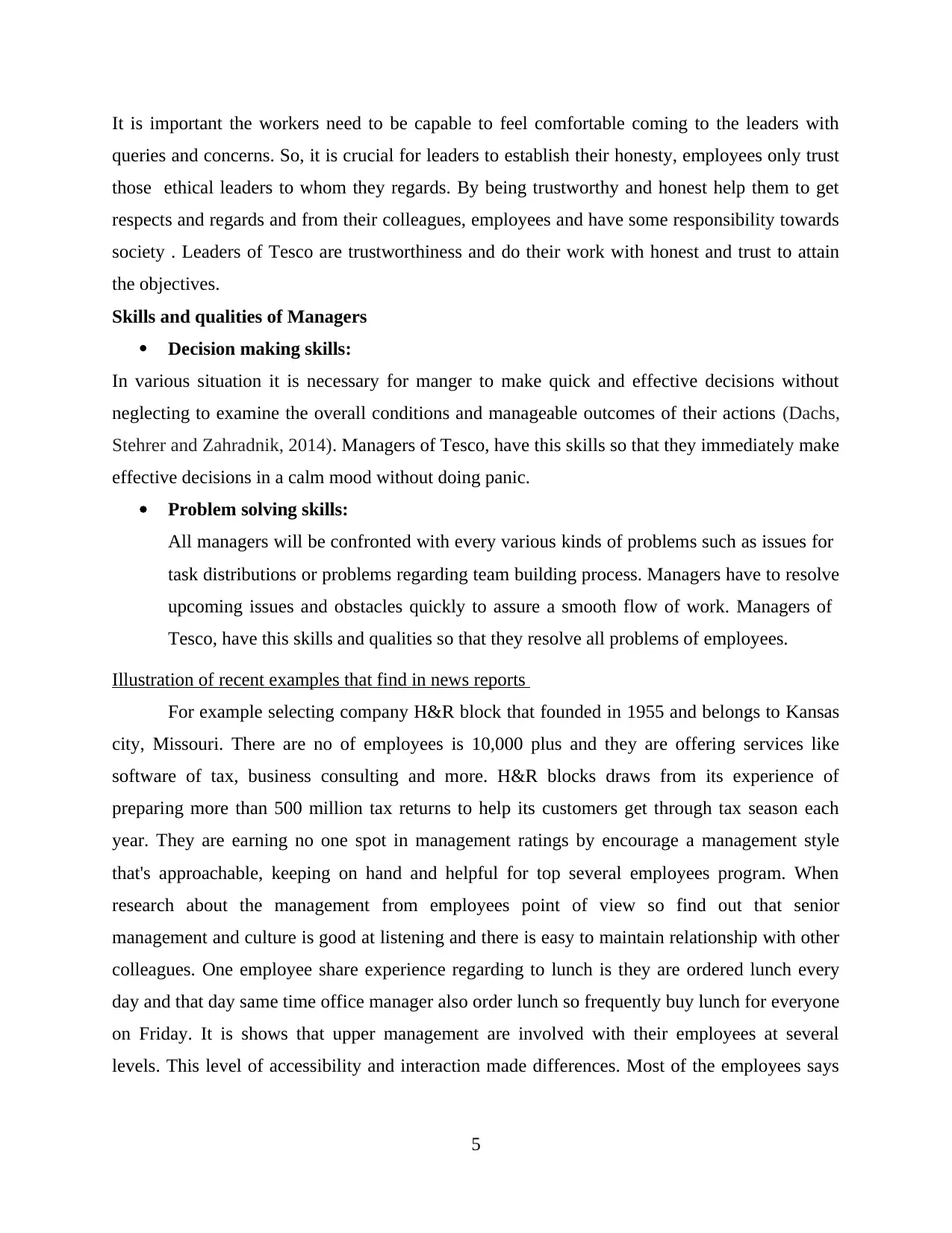
It is important the workers need to be capable to feel comfortable coming to the leaders with
queries and concerns. So, it is crucial for leaders to establish their honesty, employees only trust
those ethical leaders to whom they regards. By being trustworthy and honest help them to get
respects and regards and from their colleagues, employees and have some responsibility towards
society . Leaders of Tesco are trustworthiness and do their work with honest and trust to attain
the objectives.
Skills and qualities of Managers
Decision making skills:
In various situation it is necessary for manger to make quick and effective decisions without
neglecting to examine the overall conditions and manageable outcomes of their actions (Dachs,
Stehrer and Zahradnik, 2014). Managers of Tesco, have this skills so that they immediately make
effective decisions in a calm mood without doing panic.
Problem solving skills:
All managers will be confronted with every various kinds of problems such as issues for
task distributions or problems regarding team building process. Managers have to resolve
upcoming issues and obstacles quickly to assure a smooth flow of work. Managers of
Tesco, have this skills and qualities so that they resolve all problems of employees.
Illustration of recent examples that find in news reports
For example selecting company H&R block that founded in 1955 and belongs to Kansas
city, Missouri. There are no of employees is 10,000 plus and they are offering services like
software of tax, business consulting and more. H&R blocks draws from its experience of
preparing more than 500 million tax returns to help its customers get through tax season each
year. They are earning no one spot in management ratings by encourage a management style
that's approachable, keeping on hand and helpful for top several employees program. When
research about the management from employees point of view so find out that senior
management and culture is good at listening and there is easy to maintain relationship with other
colleagues. One employee share experience regarding to lunch is they are ordered lunch every
day and that day same time office manager also order lunch so frequently buy lunch for everyone
on Friday. It is shows that upper management are involved with their employees at several
levels. This level of accessibility and interaction made differences. Most of the employees says
5
queries and concerns. So, it is crucial for leaders to establish their honesty, employees only trust
those ethical leaders to whom they regards. By being trustworthy and honest help them to get
respects and regards and from their colleagues, employees and have some responsibility towards
society . Leaders of Tesco are trustworthiness and do their work with honest and trust to attain
the objectives.
Skills and qualities of Managers
Decision making skills:
In various situation it is necessary for manger to make quick and effective decisions without
neglecting to examine the overall conditions and manageable outcomes of their actions (Dachs,
Stehrer and Zahradnik, 2014). Managers of Tesco, have this skills so that they immediately make
effective decisions in a calm mood without doing panic.
Problem solving skills:
All managers will be confronted with every various kinds of problems such as issues for
task distributions or problems regarding team building process. Managers have to resolve
upcoming issues and obstacles quickly to assure a smooth flow of work. Managers of
Tesco, have this skills and qualities so that they resolve all problems of employees.
Illustration of recent examples that find in news reports
For example selecting company H&R block that founded in 1955 and belongs to Kansas
city, Missouri. There are no of employees is 10,000 plus and they are offering services like
software of tax, business consulting and more. H&R blocks draws from its experience of
preparing more than 500 million tax returns to help its customers get through tax season each
year. They are earning no one spot in management ratings by encourage a management style
that's approachable, keeping on hand and helpful for top several employees program. When
research about the management from employees point of view so find out that senior
management and culture is good at listening and there is easy to maintain relationship with other
colleagues. One employee share experience regarding to lunch is they are ordered lunch every
day and that day same time office manager also order lunch so frequently buy lunch for everyone
on Friday. It is shows that upper management are involved with their employees at several
levels. This level of accessibility and interaction made differences. Most of the employees says
5
Paraphrase This Document
Need a fresh take? Get an instant paraphrase of this document with our AI Paraphraser
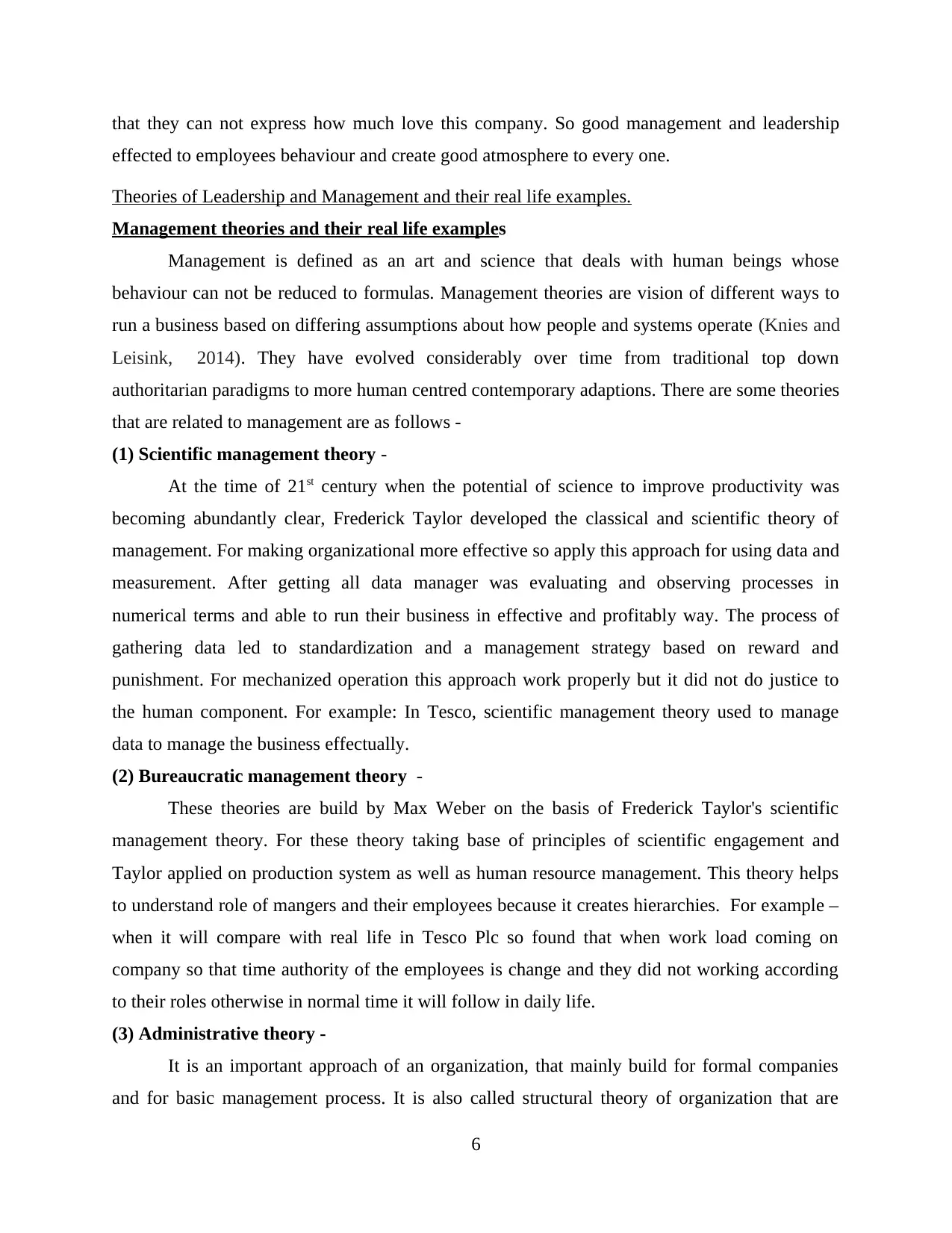
that they can not express how much love this company. So good management and leadership
effected to employees behaviour and create good atmosphere to every one.
Theories of Leadership and Management and their real life examples.
Management theories and their real life examples
Management is defined as an art and science that deals with human beings whose
behaviour can not be reduced to formulas. Management theories are vision of different ways to
run a business based on differing assumptions about how people and systems operate (Knies and
Leisink, 2014). They have evolved considerably over time from traditional top down
authoritarian paradigms to more human centred contemporary adaptions. There are some theories
that are related to management are as follows -
(1) Scientific management theory -
At the time of 21st century when the potential of science to improve productivity was
becoming abundantly clear, Frederick Taylor developed the classical and scientific theory of
management. For making organizational more effective so apply this approach for using data and
measurement. After getting all data manager was evaluating and observing processes in
numerical terms and able to run their business in effective and profitably way. The process of
gathering data led to standardization and a management strategy based on reward and
punishment. For mechanized operation this approach work properly but it did not do justice to
the human component. For example: In Tesco, scientific management theory used to manage
data to manage the business effectually.
(2) Bureaucratic management theory -
These theories are build by Max Weber on the basis of Frederick Taylor's scientific
management theory. For these theory taking base of principles of scientific engagement and
Taylor applied on production system as well as human resource management. This theory helps
to understand role of mangers and their employees because it creates hierarchies. For example –
when it will compare with real life in Tesco Plc so found that when work load coming on
company so that time authority of the employees is change and they did not working according
to their roles otherwise in normal time it will follow in daily life.
(3) Administrative theory -
It is an important approach of an organization, that mainly build for formal companies
and for basic management process. It is also called structural theory of organization that are
6
effected to employees behaviour and create good atmosphere to every one.
Theories of Leadership and Management and their real life examples.
Management theories and their real life examples
Management is defined as an art and science that deals with human beings whose
behaviour can not be reduced to formulas. Management theories are vision of different ways to
run a business based on differing assumptions about how people and systems operate (Knies and
Leisink, 2014). They have evolved considerably over time from traditional top down
authoritarian paradigms to more human centred contemporary adaptions. There are some theories
that are related to management are as follows -
(1) Scientific management theory -
At the time of 21st century when the potential of science to improve productivity was
becoming abundantly clear, Frederick Taylor developed the classical and scientific theory of
management. For making organizational more effective so apply this approach for using data and
measurement. After getting all data manager was evaluating and observing processes in
numerical terms and able to run their business in effective and profitably way. The process of
gathering data led to standardization and a management strategy based on reward and
punishment. For mechanized operation this approach work properly but it did not do justice to
the human component. For example: In Tesco, scientific management theory used to manage
data to manage the business effectually.
(2) Bureaucratic management theory -
These theories are build by Max Weber on the basis of Frederick Taylor's scientific
management theory. For these theory taking base of principles of scientific engagement and
Taylor applied on production system as well as human resource management. This theory helps
to understand role of mangers and their employees because it creates hierarchies. For example –
when it will compare with real life in Tesco Plc so found that when work load coming on
company so that time authority of the employees is change and they did not working according
to their roles otherwise in normal time it will follow in daily life.
(3) Administrative theory -
It is an important approach of an organization, that mainly build for formal companies
and for basic management process. It is also called structural theory of organization that are
6
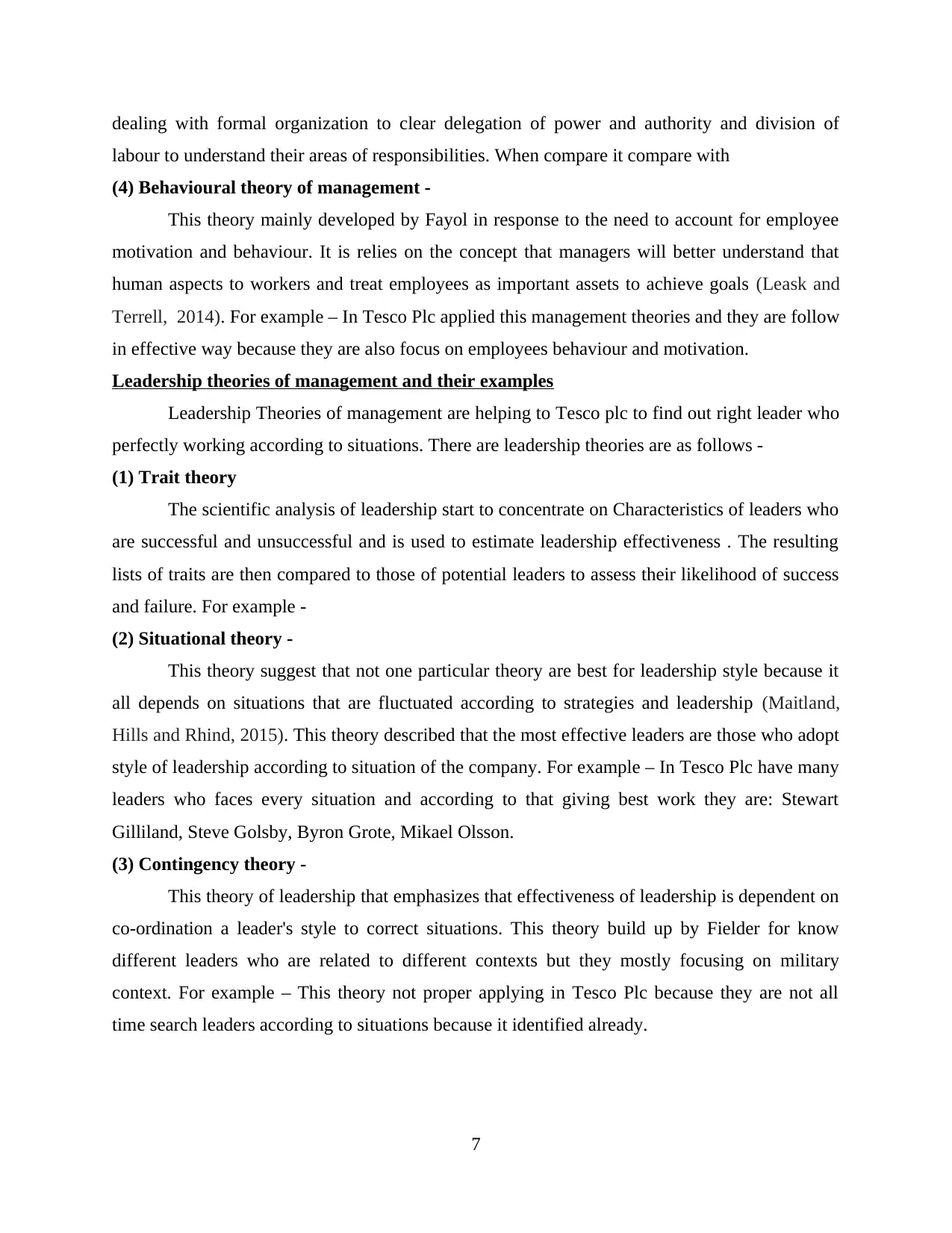
dealing with formal organization to clear delegation of power and authority and division of
labour to understand their areas of responsibilities. When compare it compare with
(4) Behavioural theory of management -
This theory mainly developed by Fayol in response to the need to account for employee
motivation and behaviour. It is relies on the concept that managers will better understand that
human aspects to workers and treat employees as important assets to achieve goals (Leask and
Terrell, 2014). For example – In Tesco Plc applied this management theories and they are follow
in effective way because they are also focus on employees behaviour and motivation.
Leadership theories of management and their examples
Leadership Theories of management are helping to Tesco plc to find out right leader who
perfectly working according to situations. There are leadership theories are as follows -
(1) Trait theory
The scientific analysis of leadership start to concentrate on Characteristics of leaders who
are successful and unsuccessful and is used to estimate leadership effectiveness . The resulting
lists of traits are then compared to those of potential leaders to assess their likelihood of success
and failure. For example -
(2) Situational theory -
This theory suggest that not one particular theory are best for leadership style because it
all depends on situations that are fluctuated according to strategies and leadership (Maitland,
Hills and Rhind, 2015). This theory described that the most effective leaders are those who adopt
style of leadership according to situation of the company. For example – In Tesco Plc have many
leaders who faces every situation and according to that giving best work they are: Stewart
Gilliland, Steve Golsby, Byron Grote, Mikael Olsson.
(3) Contingency theory -
This theory of leadership that emphasizes that effectiveness of leadership is dependent on
co-ordination a leader's style to correct situations. This theory build up by Fielder for know
different leaders who are related to different contexts but they mostly focusing on military
context. For example – This theory not proper applying in Tesco Plc because they are not all
time search leaders according to situations because it identified already.
7
labour to understand their areas of responsibilities. When compare it compare with
(4) Behavioural theory of management -
This theory mainly developed by Fayol in response to the need to account for employee
motivation and behaviour. It is relies on the concept that managers will better understand that
human aspects to workers and treat employees as important assets to achieve goals (Leask and
Terrell, 2014). For example – In Tesco Plc applied this management theories and they are follow
in effective way because they are also focus on employees behaviour and motivation.
Leadership theories of management and their examples
Leadership Theories of management are helping to Tesco plc to find out right leader who
perfectly working according to situations. There are leadership theories are as follows -
(1) Trait theory
The scientific analysis of leadership start to concentrate on Characteristics of leaders who
are successful and unsuccessful and is used to estimate leadership effectiveness . The resulting
lists of traits are then compared to those of potential leaders to assess their likelihood of success
and failure. For example -
(2) Situational theory -
This theory suggest that not one particular theory are best for leadership style because it
all depends on situations that are fluctuated according to strategies and leadership (Maitland,
Hills and Rhind, 2015). This theory described that the most effective leaders are those who adopt
style of leadership according to situation of the company. For example – In Tesco Plc have many
leaders who faces every situation and according to that giving best work they are: Stewart
Gilliland, Steve Golsby, Byron Grote, Mikael Olsson.
(3) Contingency theory -
This theory of leadership that emphasizes that effectiveness of leadership is dependent on
co-ordination a leader's style to correct situations. This theory build up by Fielder for know
different leaders who are related to different contexts but they mostly focusing on military
context. For example – This theory not proper applying in Tesco Plc because they are not all
time search leaders according to situations because it identified already.
7
⊘ This is a preview!⊘
Do you want full access?
Subscribe today to unlock all pages.

Trusted by 1+ million students worldwide
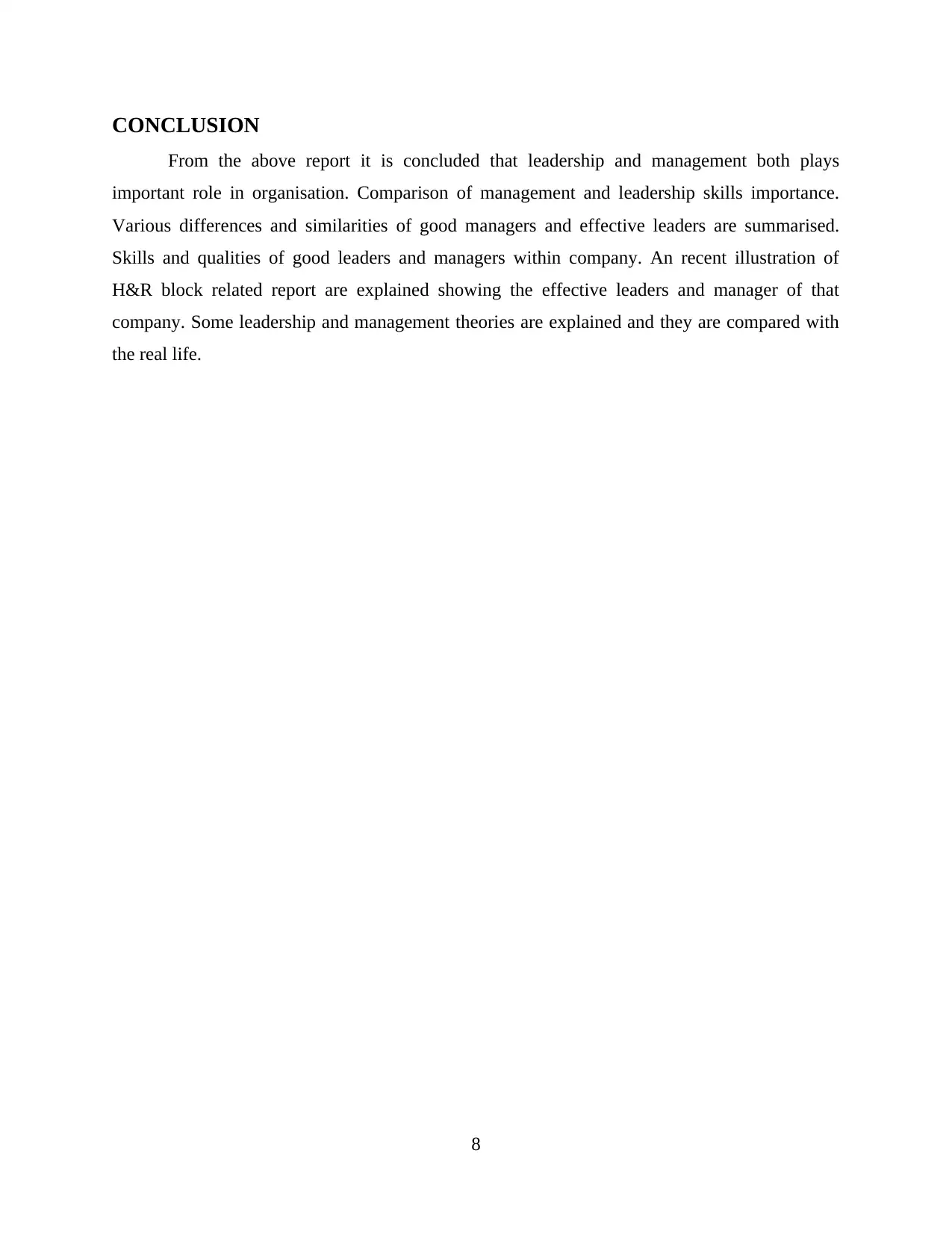
CONCLUSION
From the above report it is concluded that leadership and management both plays
important role in organisation. Comparison of management and leadership skills importance.
Various differences and similarities of good managers and effective leaders are summarised.
Skills and qualities of good leaders and managers within company. An recent illustration of
H&R block related report are explained showing the effective leaders and manager of that
company. Some leadership and management theories are explained and they are compared with
the real life.
8
From the above report it is concluded that leadership and management both plays
important role in organisation. Comparison of management and leadership skills importance.
Various differences and similarities of good managers and effective leaders are summarised.
Skills and qualities of good leaders and managers within company. An recent illustration of
H&R block related report are explained showing the effective leaders and manager of that
company. Some leadership and management theories are explained and they are compared with
the real life.
8
Paraphrase This Document
Need a fresh take? Get an instant paraphrase of this document with our AI Paraphraser
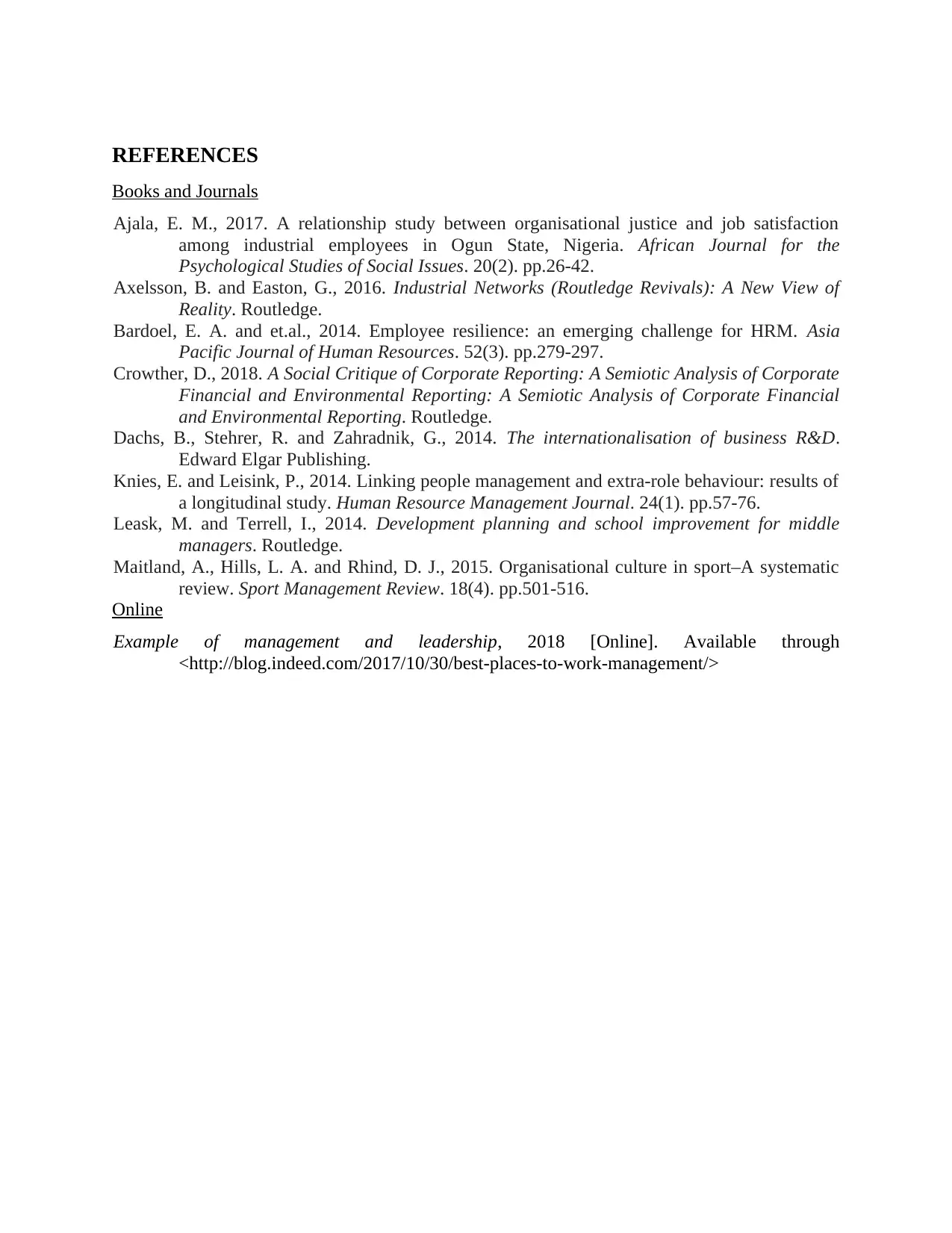
REFERENCES
Books and Journals
Ajala, E. M., 2017. A relationship study between organisational justice and job satisfaction
among industrial employees in Ogun State, Nigeria. African Journal for the
Psychological Studies of Social Issues. 20(2). pp.26-42.
Axelsson, B. and Easton, G., 2016. Industrial Networks (Routledge Revivals): A New View of
Reality. Routledge.
Bardoel, E. A. and et.al., 2014. Employee resilience: an emerging challenge for HRM. Asia
Pacific Journal of Human Resources. 52(3). pp.279-297.
Crowther, D., 2018. A Social Critique of Corporate Reporting: A Semiotic Analysis of Corporate
Financial and Environmental Reporting: A Semiotic Analysis of Corporate Financial
and Environmental Reporting. Routledge.
Dachs, B., Stehrer, R. and Zahradnik, G., 2014. The internationalisation of business R&D.
Edward Elgar Publishing.
Knies, E. and Leisink, P., 2014. Linking people management and extra‐role behaviour: results of
a longitudinal study. Human Resource Management Journal. 24(1). pp.57-76.
Leask, M. and Terrell, I., 2014. Development planning and school improvement for middle
managers. Routledge.
Maitland, A., Hills, L. A. and Rhind, D. J., 2015. Organisational culture in sport–A systematic
review. Sport Management Review. 18(4). pp.501-516.
Online
Example of management and leadership, 2018 [Online]. Available through
<http://blog.indeed.com/2017/10/30/best-places-to-work-management/>
Books and Journals
Ajala, E. M., 2017. A relationship study between organisational justice and job satisfaction
among industrial employees in Ogun State, Nigeria. African Journal for the
Psychological Studies of Social Issues. 20(2). pp.26-42.
Axelsson, B. and Easton, G., 2016. Industrial Networks (Routledge Revivals): A New View of
Reality. Routledge.
Bardoel, E. A. and et.al., 2014. Employee resilience: an emerging challenge for HRM. Asia
Pacific Journal of Human Resources. 52(3). pp.279-297.
Crowther, D., 2018. A Social Critique of Corporate Reporting: A Semiotic Analysis of Corporate
Financial and Environmental Reporting: A Semiotic Analysis of Corporate Financial
and Environmental Reporting. Routledge.
Dachs, B., Stehrer, R. and Zahradnik, G., 2014. The internationalisation of business R&D.
Edward Elgar Publishing.
Knies, E. and Leisink, P., 2014. Linking people management and extra‐role behaviour: results of
a longitudinal study. Human Resource Management Journal. 24(1). pp.57-76.
Leask, M. and Terrell, I., 2014. Development planning and school improvement for middle
managers. Routledge.
Maitland, A., Hills, L. A. and Rhind, D. J., 2015. Organisational culture in sport–A systematic
review. Sport Management Review. 18(4). pp.501-516.
Online
Example of management and leadership, 2018 [Online]. Available through
<http://blog.indeed.com/2017/10/30/best-places-to-work-management/>

2
⊘ This is a preview!⊘
Do you want full access?
Subscribe today to unlock all pages.

Trusted by 1+ million students worldwide
1 out of 12
Related Documents
Your All-in-One AI-Powered Toolkit for Academic Success.
+13062052269
info@desklib.com
Available 24*7 on WhatsApp / Email
![[object Object]](/_next/static/media/star-bottom.7253800d.svg)
Unlock your academic potential
Copyright © 2020–2025 A2Z Services. All Rights Reserved. Developed and managed by ZUCOL.




